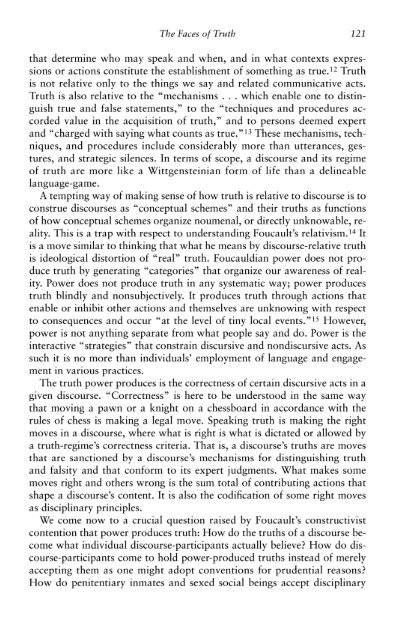Starting with Foucault: An Introduction to Genealogy, Second Edition
Starting with Foucault: An Introduction to Genealogy, Second Edition
Starting with Foucault: An Introduction to Genealogy, Second Edition
Create successful ePaper yourself
Turn your PDF publications into a flip-book with our unique Google optimized e-Paper software.
The Faces of Trzcth 121that determine who may speak and when, and in what contexts expressionsor actions constitute the establishment of something as true.lVruthis not relative only <strong>to</strong> the things we say and related communicative acts.Truth is also relative <strong>to</strong> the ""mechanisms . . . which enable one <strong>to</strong> distinguishtrue and false statements," <strong>to</strong> the "techniques and procedures accordedvalue in the acquisition of truth," and <strong>to</strong> persons deemed expertand "charged <strong>with</strong> saying what counts as trueems These mechanisms, techniques,and procedures include considerably more than utterances, gestures,and strategic silences. In terms of scope, a discourse and its regimeof truth are more like a Wirtgensteinian form of life than a delineablelaaguqe-game.A tempting way of making sense of how truth is relative <strong>to</strong> discourse is <strong>to</strong>construe discourses as "conceptual schemes" and their truths as functionsof haw conceptual schemes organize mumenal, or directly unknowable, reality.This is a trap <strong>with</strong> respect <strong>to</strong> understanding Faucault's relativism.'"tis a move similar <strong>to</strong> thinking that what he means by discourse-relative truthis ideological dis<strong>to</strong>rtion of "real" truth. Foucauidian power does not producetruth by generating "categories" that oqanize our awareness of reality.Power does not produce truth in any sy~ernacic way; power producestruth blindly and nonsubectively h produces truth through actions thatenable or inhiltit other actions and themselves are unknowing <strong>with</strong> respecr<strong>to</strong> consequences and occur "at the level of tiny local events.""2" Howeves,power is not anything separate from what people say and do, Power is theinteractive ""strategies"" that constrain discursive and nondiscursive acts, Assuch it is n0 more than individtrals\mployment of language and engagementin various practices.The truth power produces is the correctness of cextain discursive acts in agiven discourse, ""Gorrectness" is here <strong>to</strong> be unders<strong>to</strong>od in the same waythat moving a pawn or a knight on a chessboard in accordance <strong>with</strong> therules of chess is making a legal move. Speaking truth is malting the rightmoves in a discourse, where what is right is what is dictated or allowed bya truth-regme" correctness criteria, That is, a discourse" truths are movesthat are sanctioned by a discourse's mechanisms far distinguishing truthand falsity and that conform <strong>to</strong> its expert judgments, What makes somemoves right and others wrong is the sum <strong>to</strong>tal of contributing actions thatshape a discourse's content. It is also the codification of some right movesas disciplinary prindples,We come now <strong>to</strong> a crucial question raised by <strong>Foucault</strong>" sonstructivistcontention that power prodwes truth: How do the truths of a discourse becomewhat individual discourse-participants actually believe? How do discourse-participantscome <strong>to</strong> hold power-produced truths instead of merelyaccepting them as one might adopt conventions fur prudential reasons?How do penitentiary inmates and sexed social beings accept disciplinary


